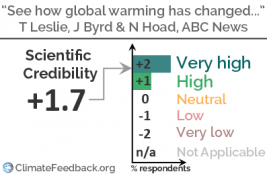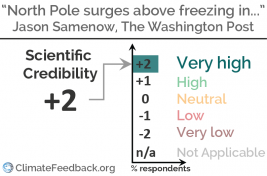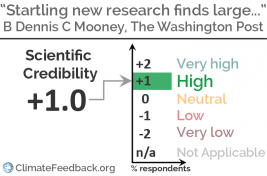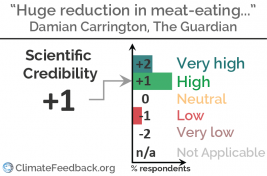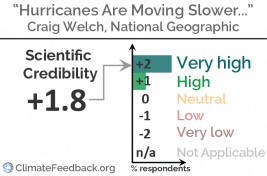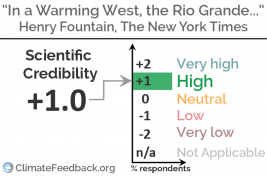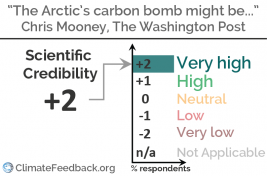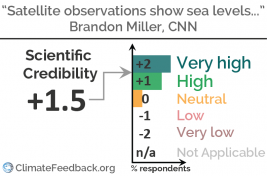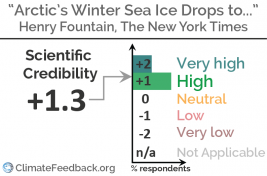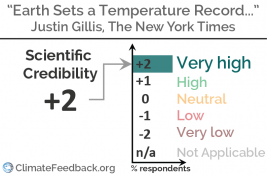.
Articles tagged as: Sound reasoning definition
ABC article effectively illustrates important climate trends for Australian readers
in Australian Broadcasting Company, by Tim Leslie, Joshua Byrd, Nathan Hoad
“This article is exceptionally good in delivering accurate information in an engaging way. There are many useful statements made about the effects of climate change on extreme weather globally and in Australia and these have been backed up by links to relevant peer-reviewed literature.”
— 11 Dec 2019
Washington Post article accurately discusses warm Arctic weather event
in The Washington Post, by Jason Samenow
“This article accurately describes the Arctic warming event and associated surprise by scientists, includes multiple explanations for possible causes, and does not overstate any connections to climate change, pointing out that more data is needed to know if these above-freezing events will be a new Arctic normal.”
— 14 Jan 2019
Washington Post accurately describes ocean warming study (which has since been corrected)
in The Washington Post, by Chris Mooney, Brady Dennis
“The Washington Post article accurately reports the results and links to other topics using reliable sources. Quotations from Pieter Tans and Paul Durack add important caveats showing that this is strong new evidence but not the final say. This caution is vital for readers to interpret the findings.”
— 03 Nov 2018
Guardian story accurately describes study on environmental impacts of our food system
in The Guardian, by Damian Carrington
“Although the presented facts are clear, the scientists give a personal interpretation of the priorities and needed policies, which are not covered in the source. The data give added value, but are in line with earlier studies.”
— 17 Oct 2018
National Geographic accurately covers research pointing to slower-moving hurricanes
in National Geographic, by Craig Welch
“This is an important topic and the article explains the new research findings clearly… Highlighting how this result about slowing storms is consistent across two studies that employ very different methodologies further helps convey to the public how we try to use multiple lines of evidence to understand how our world works and how it may chance in the future.”
— 08 Jun 2018
New York Times story accurately describes Rio Grande’s climate context
in The New York Times, by Henry Fountain
“The issue of water resource management in the western US and how it fits within a changing climate is extremely complex and spans many disciplines from climatology to hydrology to city planning to population dynamics, and so on. This article does a nice job presenting the very basics of the climate science involved and tying the greater changes to the personal stories of people in the region.”
— 31 May 2018
Washington Post accurately covers permafrost study, albeit under a somewhat sensational headline
in The Washington Post, by Chris Mooney
The article accurately described a study indicating that more of the carbon released from thawing permafrost will be released as methane and provided context on its overall implications by quoting comments from two other researchers. The article’s headline, however, may mislead readers through the use of the sensational phrase “the Arctic’s carbon bomb”, which calls to mind a catastrophic, explosive release of greenhouse gas.
— 22 Mar 2018
New satellite measurements show sea level rise is accelerating, as CNN accurately reports
in CNN, by Brandon Miller
“Global geological sea-level data, data from tide gauge and now satellite data all show that the rate of sea level rise is accelerating. These accelerations in sea level is a cause for great concern.”
— 15 Feb 2018
New York Times accurately covers 2017 record low Arctic winter sea ice extent
in The New York Times, by Henry Fountain
“The article accurately reports on the state of Arctic sea ice at the annual maximum (in March) and its causes, and gives an insightful discussion as to the implications. There is one point which may be misleading…”
— 16 Jan 2018
New York Times’ news coverage of 2016 global temperature data was an accurate summary
in The New York Times, by Justin Gillis
“A clear and accurate article on the temperature record in 2016, looking back at the records in 2015 and 2014. The article places them in the proper context of long-term warming, while mentioning the special effect that helped make the year a record.”
— 16 Jan 2018

